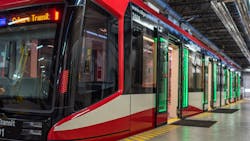Calgary City Council approves revised Green Line LRT Phase 1 project scope
Calgary City Council has approved a revised Green Line light-rail transit (LRT) Phase 1 project scope, capital funding request and delivery model, as recommended by the Green Line Board, to ensure construction can begin while responsibly addressing the cost inflation that is impacting all major infrastructure projects across North America.
To respond to rising costs and potential future escalations, while maximizing the benefits identified in the 2020 Council approved business case for the Investing in Canada Infrastructure Program grant application, the board’s recommendations were based on both the extensive work undertaken to reduce costs through value engineering and design optimization and the direct outcomes of contractor negotiations during the Development Phase.
Phase 1 of the Green Line LRT is the largest infrastructure investment in the history of the city of Calgary, Alberta. The more than C$1.4 billion (US$1 billion) spent to date includes C$350 million (US$253.3 million) in land acquisition, C$400 million (US$289.5 million) in enabling works such as the utility upgrades nearing completion in the Beltline and downtown and the new fleet of low-floor light-rail vehicles, scheduled to begin arriving in late 2027.
Green Line main construction for Phase 1 will now begin by building the core from Lynnwood/Millican in the southeast to Eau Claire downtown, connecting into the existing Red and Blue LRT lines. Construction of the remainder of the council-approved Phase 1 south to Shepard, as well as any future extensions north or south, will proceed when additional funding is in place. The city notes the decision will allow for new bus rapid transit and bus service in the southeast to provide connections into the LRT, contributing to the projected opening day ridership of approximately 32,000 Calgarians.
The council also approved deferring construction of the Centre Street S. station and shifting the 4 Street S.E. station near Stampede Park from underground to street level, to better facilitate future regional transit connections and integration with the planned Grand Central Station.
The city notes significant cost savings were created. However, without additional funding from the province of Alberta and the government of Canada for the first phase, the city will increase their investment in the Green Line by contributing C$705 million (US$510.8 million) to build the core of Phase 1 at a total new project cost of C$6.25 billion (US$4.5 billion), up from the approved budget of C$5.53 billion (US$4 billion) in 2020.
"Today's decision is more than a decade in the making and sets Calgary up for success for years to come, especially at a time when we are the fastest growing city in the nation. The Green Line is a critical piece of transportation infrastructure that demonstrates all three orders of government are focused on collaboration and cooperation to get megaprojects moving," said Mayor of Calgary Jyoti Gondek.
Current city capital investments and municipal property taxes in 2025 will not be impacted by the increased investment in the Green Line.
The city notes a change from the Design-Build-Finance contracting strategy to a multi-contracting strategy was also approved. The change will save approximately C$600 million (US$434.3 million) and allow the Green Line to execute contracts on individually negotiated scopes of work.
“The board is confident that revising the construction phasing for Phase 1, building from Lynnwood/Millican to Eau Claire, is the best approach to control costs, mitigate risks and build the critical core of Green Line” said Don Fairbairn, chair, Green Line Board. “We appreciate that some Calgarians will be disappointed that they will have to wait longer for the new LRT service to reach their community but starting construction will lay a foundation for Calgary’s sustained growth and ensure the long-term benefits of housing, connectivity and ridership can be maximized.”
In addition to ridership numbers, the revised Phase 1 of the Green Line will connect Calgarians to 162,000 jobs within walking distance of stations, remove 15,000 metric tons of greenhouse gas emissions annually and unlock a maximum potential of 70,000 housing units through strategic transit-oriented development along the alignment.
The Green Line will work with the province of Alberta and government of Canada on approval of the revised funding agreements, in advance of signing the project agreements and beginning main construction later this year.
